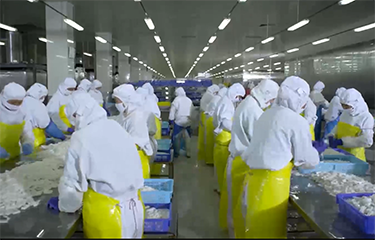Two groups devoted to human rights advocacy are calling on the Canadian government to implement targeted sanctions against Chinese seafood companies named in an Outlaw Ocean Project report as using Uyghur and forced labor.
The Uyghur Rights Advocacy Project (URAP) and the Human Rights Action Group formally submitted a recommendation to implement sanctions against Yantai Sanko Fisheries, Yantai Longwin Food, the Chishan Group, Shandong Meijia Group, Qingdao Tianyuan Aquatic Products, the Rongsense Group, and the Xinjiang Zhongtai Zhihui Modern Service – all companies named in Outlaw Ocean’s report. The Outlaw Ocean Project recently revealed additional video evidence connecting the companies to Uyghur labor in seafood processing operations and forced labor on board fishing vessels.
A press release from the two organizations said that the evidence in the report, and the “grave scope and severity of Ughur forced labor” that it found, is grounds for Canada to implement targeted sanctions. The groups said the government can use Canada’s Special Economic Measures (People’s Republic of China) Regulations, enacted in March 2021, to target the companies.
Goods produced with the use of labor from Xinjiang province, located in the northwest of China and the home of the Uyghur ethnic group, have been outlawed in the U.S. under Uyghur Forced Labor Protection Act. A trade agreement between Canada, the U.S., and Mexico also contains rules against the importation of goods produced in whole or in part by forced or compulsory labor. Canada has urged companies to closely examine their business relationships in China related to Xinjiang and workers from the Chinese province.
“Millions of Uyghurs have been relocated through labor transfers, many of whom are forced to work in seafood processing facilities,” the release from URAP and the Human Rights Action Group states. “Labor transfers are an integral part of the systematic plan of detention, torture, surveillance, enslavement and persecution of Uyghurs.”
The United Nations has recognized serious human rights violations in Xinjiang province, including separating families and restricting religious freedom and the rights to privacy and movement.
Canada, URAP, and the Human Rights Action Group said, should sanction companies named by the Outlaw Ocean report as part of efforts to advance “accountability and justice for the crimes committed by the Chinese Communist Party and their collaborators.”
“By adding these seven Chinese entities to the sanctions list under the Special Economic Measures (People’s Republic of China) Regulations, the government of Canada would be sending a strong signal to Canadian importers, to the People’s Republic of China, and to the seven Chinese entities that products made using Uyghur forced labor will not be tolerated and will not be permitted to enter the Canadian market,” the two groups said.
URAP Executive Director Mehmet Tohti called for decisive action from Canada, “or else Canada will effectively be a dumping ground for products made with the use of Uyghur forced labor.”
Tohti, an activist in exile, is also the co-founder of the World Uyghur Congress and has lobbied the Canadian government to boycott any products produced in China by Uyghur labor. Tohti has reported threats against him from the Chinese government, which he told Global News includes calls from Chinese police officers informing him about dead family members in China.
Canadian companies were also identified by the Outlaw Ocean Project, which published a discussion tool outlining the project's correspondence with more than 300 different entities. Of those, 31 are listed as being headquartered in Canada – including High Liner Foods, which soon after the report was published dropped its relationship with Yantai Sanko Fisheries, one of the Chinese processors named by Outlaw Ocean.
Photo courtesy of The Outlaw Ocean Project







